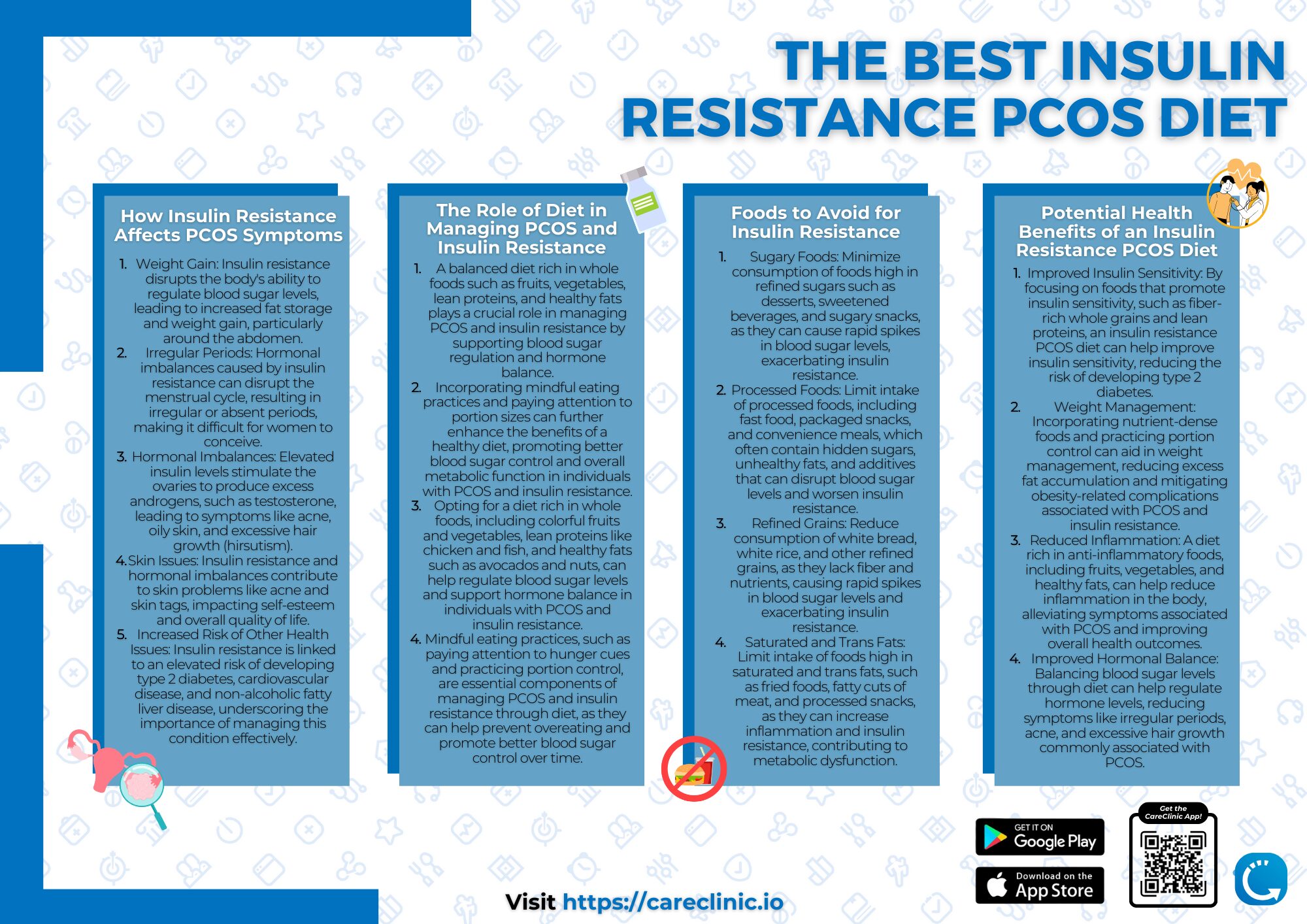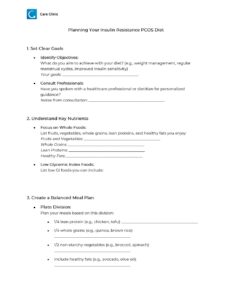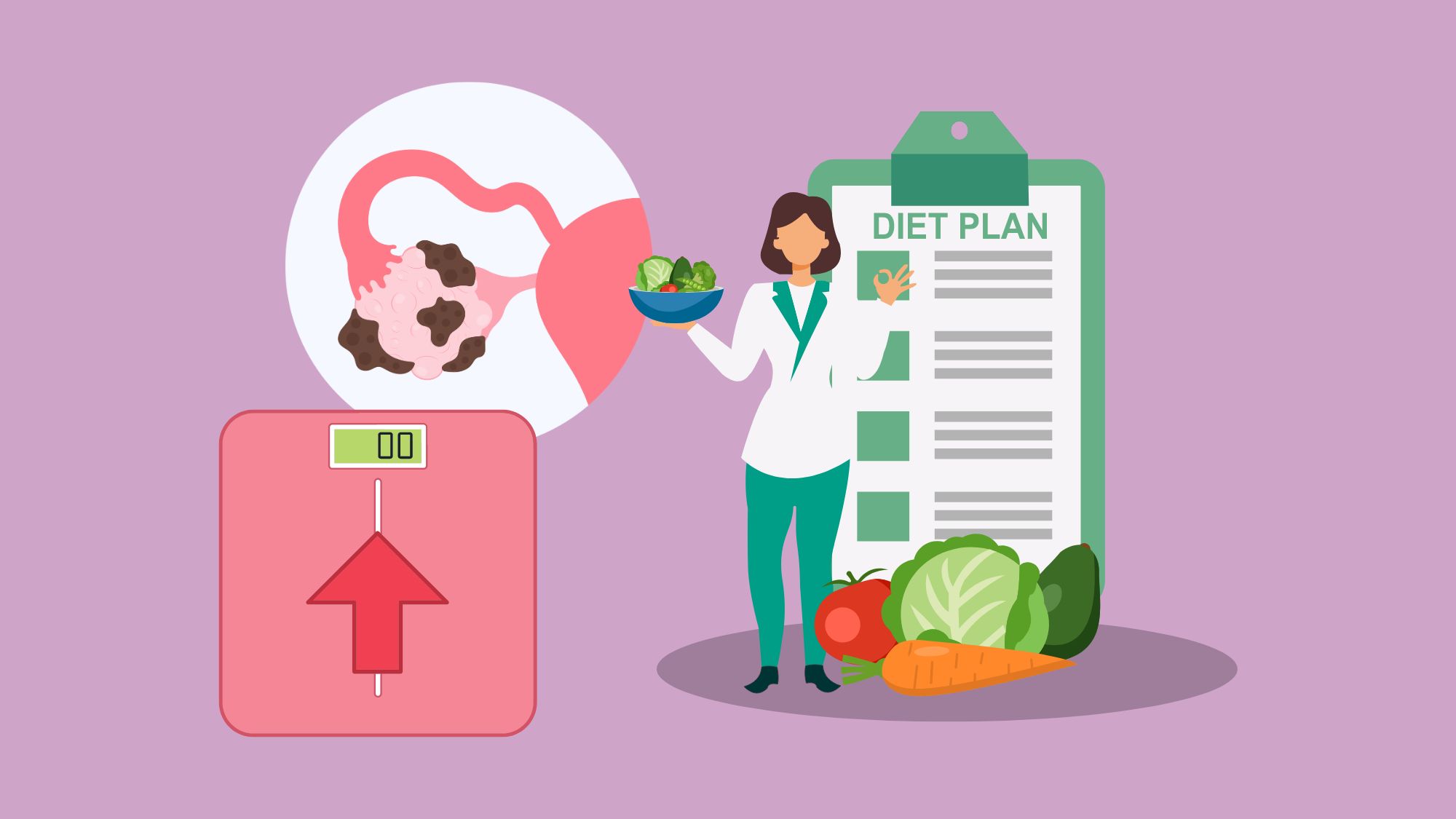
Polycystic Ovary Syndrome (PCOS) is a common endocrine disorder that affects many women worldwide. One of the main underlying factors contributing to PCOS is insulin resistance, a condition in which the body becomes less responsive to the hormone insulin. This can lead to a range of symptoms, including weight gain, irregular periods, and hormonal imbalances. However, by adopting the right insulin resistance PCOS diet and lifestyle choices, you can effectively reduce the impact of PCOS on your quality of life.[1]
Understanding Insulin Resistance and PCOS
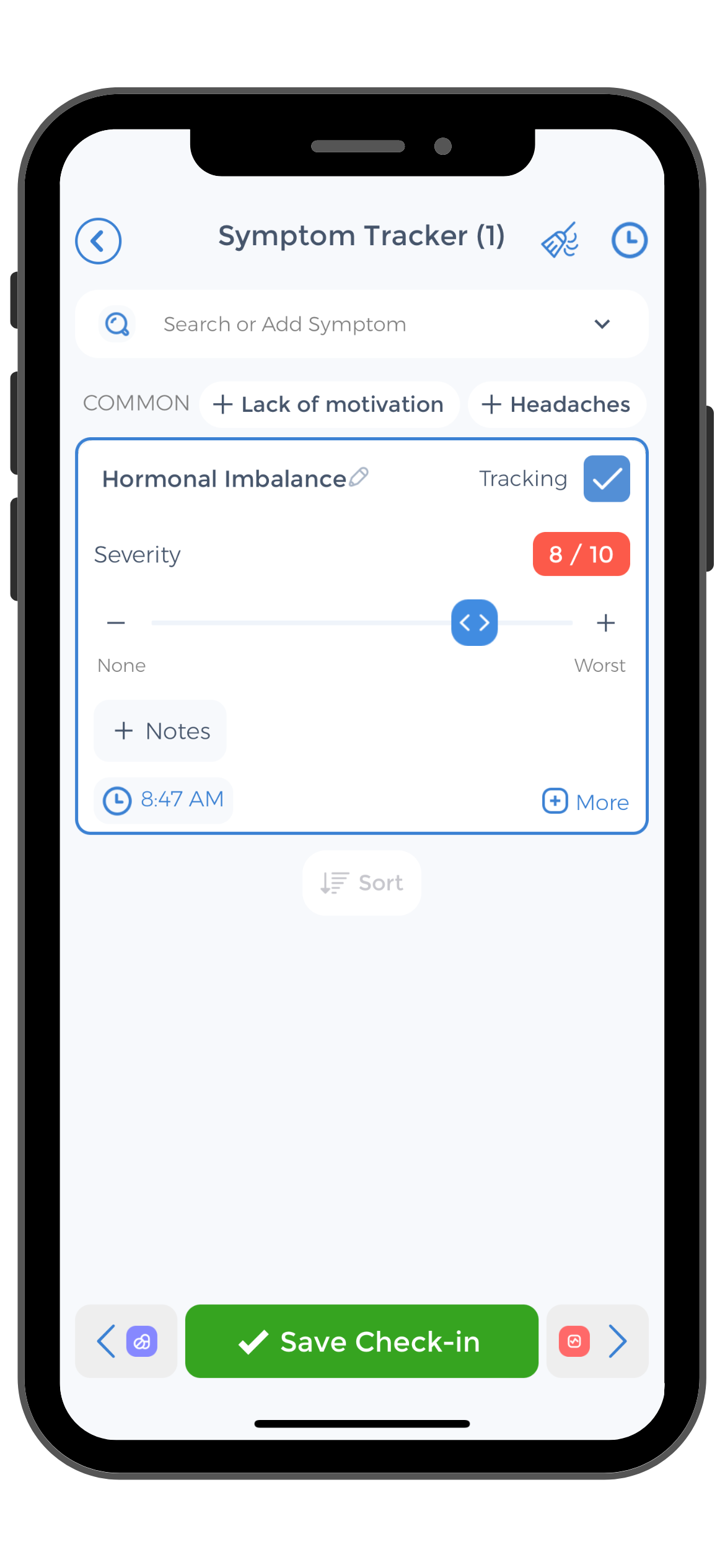 Insulin resistance occurs when cells in your body do not respond effectively to insulin, which is responsible for regulating blood sugar levels. In the case of PCOS, insulin resistance can exacerbate the hormonal imbalances and contribute to the development of cysts in the ovaries. Understanding the link between insulin resistance and PCOS is crucial in order to effectively manage the condition.
Insulin resistance occurs when cells in your body do not respond effectively to insulin, which is responsible for regulating blood sugar levels. In the case of PCOS, insulin resistance can exacerbate the hormonal imbalances and contribute to the development of cysts in the ovaries. Understanding the link between insulin resistance and PCOS is crucial in order to effectively manage the condition.
Insulin resistance is a complex metabolic condition that can have far-reaching effects on the body beyond just blood sugar regulation. It is often associated with obesity, physical inactivity, and a diet high in processed meats and sugars.
When insulin resistance occurs, the cells’ ability to take in glucose from the bloodstream is impaired, leading to elevated blood sugar levels. This can trigger a cascade of events that impact various systems in the body, including the reproductive system in the case of PCOS.
The Link Between Insulin Resistance and PCOS
Insulin resistance and PCOS are closely interconnected. When cells do not respond to insulin properly, the pancreas compensates by producing more insulin. This excess insulin can stimulate the ovaries to produce more androgen hormones, such as testosterone, which can disrupt the normal menstrual cycle and lead to symptoms of PCOS.
Moreover, the relationship between insulin resistance and PCOS is bidirectional, meaning that each condition can worsen the other. Insulin resistance can exacerbate the symptoms of PCOS, while the hormonal imbalances characteristic of PCOS can also contribute to insulin resistance.
This vicious cycle can make managing both conditions challenging and underscores the importance of a comprehensive treatment approach that addresses both insulin resistance and PCOS symptoms simultaneously.
How Insulin Resistance Affects PCOS Symptoms
Insulin resistance can worsen PCOS symptoms in several ways. It can contribute to weight gain and difficulty losing weight, as insulin resistance makes it harder for the body to metabolize carbohydrates and fats efficiently. Insulin resistance can also interfere with ovulation and lead to irregular periods, making it more difficult to conceive. Additionally, insulin resistance can exacerbate hormonal imbalances, leading to acne, excessive hair growth, and mood swings.
Furthermore, insulin resistance can increase the risk of developing other health complications, such as type 2 diabetes, cardiovascular disease, and non-alcoholic fatty liver disease. The systemic effects of insulin resistance highlight the importance of early detection and intervention to prevent long-term consequences. By addressing insulin resistance through lifestyle modifications, medication, and targeted therapies, women with PCOS can better manage PCOS symptoms and improve their overall health outcomes.
The Role of Diet in Managing PCOS and Insulin Resistance
A balanced and nutritious diet plays a pivotal role in managing both PCOS and insulin resistance. By making conscious dietary choices, you can support insulin sensitivity and hormonal balance, ultimately alleviating the symptoms associated with PCOS.
When it comes to managing PCOS and insulin resistance, it’s not just about what you eat but also how you eat. Eating mindfully and paying attention to portion sizes can help prevent overeating and promote better blood sugar control. Additionally, incorporating regular physical activity into your routine can further enhance the benefits of a healthy diet in managing these conditions.
The Importance of Nutrition in PCOS Management
Proper nutrition is crucial for PCOS management as it helps regulate blood sugar levels and supports hormone balance. A diet rich in whole foods, such as fruits, vegetables, whole grains, lean proteins, and healthy fats, can provide the necessary nutrients to support your overall health and wellbeing.
In addition to nutrient-dense foods, staying hydrated is also key in managing PCOS. Drinking an adequate amount of water throughout the day can help improve insulin sensitivity, aid in digestion, and support overall metabolic function.
How Diet Can Influence Insulin Levels
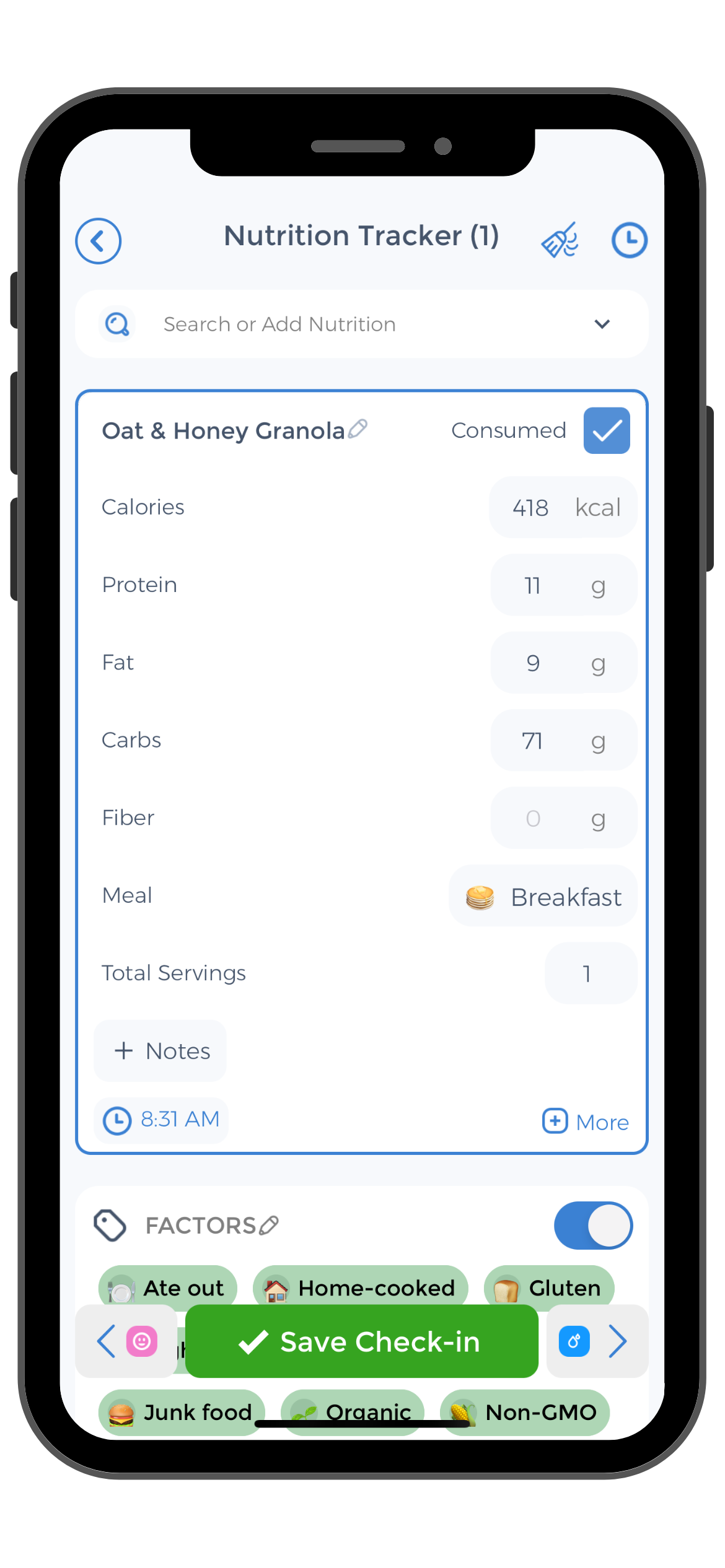 The food choices you make can significantly impact your insulin levels. By opting for foods with a low glycemic index, which release sugar into the bloodstream more slowly, you can help prevent blood sugar spikes and support insulin sensitivity. Examples of low glycemic index foods include leafy greens, berries, whole grains, and legumes.
The food choices you make can significantly impact your insulin levels. By opting for foods with a low glycemic index, which release sugar into the bloodstream more slowly, you can help prevent blood sugar spikes and support insulin sensitivity. Examples of low glycemic index foods include leafy greens, berries, whole grains, and legumes.
Focusing on a diet that is high in fiber can also benefit individuals with PCOS and insulin resistance. Fiber-rich foods not only help with maintaining healthy blood sugar levels but also promote satiety, which can aid in weight management – an important aspect of managing PCOS and insulin resistance.[4][5]
Key Components of an Insulin Resistance PCOS Diet
An insulin resistance PCOS diet should focus on incorporating specific foods while avoiding others that can exacerbate insulin resistance. By making informed choices, you can optimize your dietary intake for managing PCOS effectively.
When it comes to an insulin resistance PCOS diet, it’s not just about what you exclude from your meals, but also about what you include. Let’s take a closer look at some of the foods that can play a crucial role in supporting your health and managing PCOS.
Foods to Include in Your Diet
Include the following foods in your insulin resistance PCOS diet:
- Colorful fruits and vegetables: These vibrant and nutrient-rich foods are not only delicious but also packed with vitamins, minerals, and antioxidants. They support overall health and help reduce inflammation, which is often associated with PCOS.
- Lean proteins: Opt for sources such as chicken, turkey, fish, tofu, and legumes to ensure an adequate intake of protein for muscle maintenance and repair. Protein is essential for balancing blood sugar levels and promoting satiety, which can help manage insulin resistance.
- Healthy fats: Incorporate foods like avocados, nuts, seeds, and olive oil into your diet. These healthy fats support hormone production and reduce inflammation, both of which are important factors in managing PCOS symptoms.
- Whole grains: Choose whole grain options, such as quinoa, brown rice, and oats, instead of refined grains. Whole grains are rich in fiber, which can help stabilize blood sugar levels and improve insulin sensitivity.
Now that we’ve covered the foods to include, let’s shift our focus to the foods that you should avoid or limit in your insulin resistance PCOS diet.
Foods to Avoid for Insulin Resistance
Avoid the following foods that can worsen insulin resistance:
- Sugar and sugary foods: Minimize your intake of refined sugar, soda, desserts, and sweetened beverages. These high-sugar foods can cause spikes in blood sugar levels and contribute to insulin resistance.
- Processed foods: Limit your consumption of processed foods, which often contain hidden sugars and unhealthy fats. These foods can disrupt your hormonal balance and worsen insulin resistance.
- White bread and refined grains: Substitute white bread and refined grains with whole grain alternatives. Refined grains lack fiber and nutrients, and they can lead to rapid spikes in blood sugar levels.
- Saturated and trans fats: Reduce your intake of foods high in saturated and trans fats, such as fried foods and fatty cuts of meat. These fats can contribute to inflammation and insulin resistance, so it’s best to opt for healthier fat sources.
By incorporating the right foods and avoiding those that can worsen insulin resistance, you can take a proactive approach to managing PCOS and supporting your overall well-being. Remember to consult with a healthcare professional or registered dietitian for personalized guidance tailored to your specific needs.
Planning Your Insulin Resistance PCOS Diet
Download Free Planning Your Insulin Resistance PCOS Diet PDF
Planning is key to adopting a sustainable and effective insulin resistance PCOS diet. By creating a balanced meal plan and incorporating small changes over time, you can successfully implement long-term dietary changes that support your health and wellbeing.
When it comes to planning your insulin resistance PCOS diet, it’s essential to consider not just what you eat, but also how you eat. Mindful eating practices, such as paying attention to hunger and fullness cues, can help you develop a healthier relationship with food. Taking the time to savor each bite and appreciate the flavors and textures of your meals can enhance satisfaction and prevent overeating.
Creating a Balanced Meal Plan
Start by dividing your plate into four quarters. Fill one quarter with lean protein, such as chicken or tofu. Then, fill another quarter with whole grains like quinoa or brown rice. Fill half of your plate with non-starchy vegetables like broccoli, spinach, or peppers. Lastly, include a source of healthy fats, such as avocado or olive oil. This balanced approach can help regulate blood sugar levels and support hormone balance.
Additionally, incorporating a variety of colors on your plate can provide a range of nutrients that support overall health. Different colored fruits and vegetables contain unique vitamins, minerals, and antioxidants that play essential roles in maintaining optimal health. Aim to include a rainbow of produce in your meals to maximize nutritional benefits.
Tips for Sustainable Dietary Changes
When embarking on an insulin resistance PCOS diet, it’s important to make sustainable lifestyle changes. Consider the following tips to support your journey:
- Gradually introduce changes: Start by making small changes to your diet and gradually incorporate healthier choices.
- Meal prepping: Plan and prepare your meals in advance to ensure you have nutritious options readily available.
- Stay hydrated: Drink plenty of water throughout the day to support digestion, metabolism, and overall health.
- Find support: Seek guidance from a registered dietitian or join support groups to stay motivated and accountable.
Remember, sustainable changes take time and consistency. Celebrate your progress along the way and focus on building a positive and nourishing relationship with food for long-term health and well-being.[6]
Potential Health Benefits of an Insulin Resistance PCOS Diet
Adopting an insulin resistance PCOS diet can have various potential health benefits, beyond managing PCOS and insulin resistance.
Polycystic Ovary Syndrome (PCOS) is a common endocrine disorder that affects reproductive-age women. It is characterized by hormonal imbalances, irregular periods, and the development of cysts on the ovaries. One of the key features of PCOS is insulin resistance, which can lead to elevated blood sugar levels and an increased risk of developing type 2 diabetes.
Improving Insulin Sensitivity Through Diet
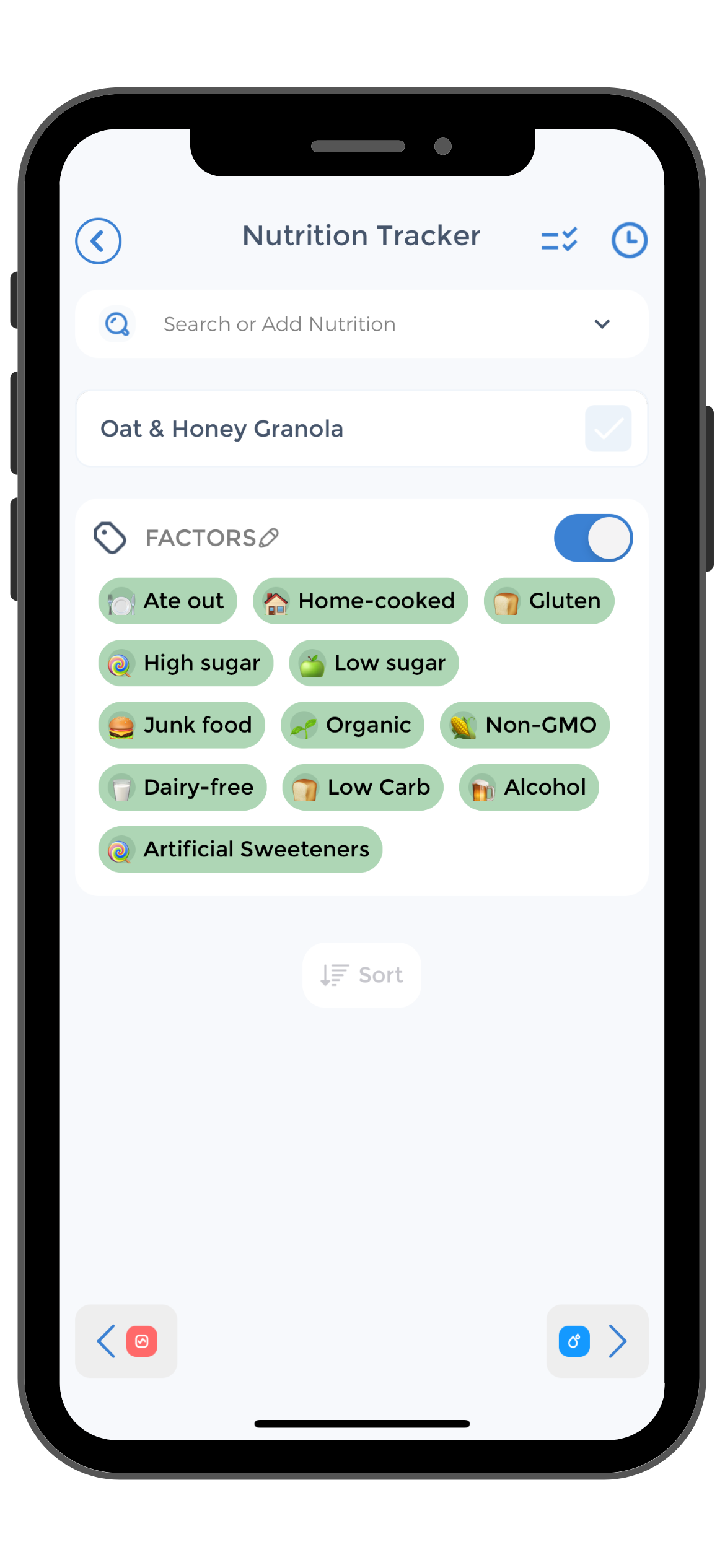 By focusing on foods that promote insulin sensitivity, such as those rich in fiber and low on the glycemic index, you can improve insulin sensitivity and reduce the risk of developing type 2 diabetes. This can positively impact your long-term health and wellbeing.
By focusing on foods that promote insulin sensitivity, such as those rich in fiber and low on the glycemic index, you can improve insulin sensitivity and reduce the risk of developing type 2 diabetes. This can positively impact your long-term health and wellbeing.
Fiber-rich foods like whole grains, fruits, and vegetables help slow down the absorption of sugar in the bloodstream, preventing spikes in blood glucose levels. This, in turn, reduces the demand on the pancreas to produce insulin, helping to improve insulin sensitivity over time. Additionally, incorporating sources of healthy fats, such as avocados and nuts, can further support insulin regulation and overall metabolic health.
Other Health Benefits of a PCOS-Friendly Diet
An insulin resistance PCOS diet can also help in maintaining a healthy weight, reducing inflammation, and supporting cardiovascular health. By prioritizing a well-rounded diet, you can potentially decrease the severity of PCOS symptoms and improve overall health.
Inflammation is a common feature of PCOS and is linked to insulin resistance and other metabolic disturbances. Including anti-inflammatory foods like fatty fish, turmeric, and leafy greens can help reduce inflammation in the body, potentially alleviating symptoms associated with PCOS.
Furthermore, a diet rich in antioxidants from colorful fruits and vegetables can support cardiovascular health by reducing oxidative stress and protecting against heart disease.
Managing PCOS with an Insulin Resistance Healthy Diet
An insulin resistance PCOS diet is an essential component of managing PCOS and optimizing your health. By understanding the link between insulin resistance and PCOS, focusing on nutrition, and making informed dietary choices, you can effectively manage your symptoms and improve your quality of life.
Remember to consult with a healthcare professional or registered dietitian for personalized advice and support on your journey to managing PCOS through diet.[7]
Use the CareClinic App to Monitor Blood Sugar
Embarking on your journey to manage PCOS with an insulin resistance diet is made easier with the CareClinic App. This comprehensive health app allows you to track your daily food intake, monitor your symptoms, and set reminders for medication and physical activity.
With features like the diet diary and symptom tracker, you can gain insights into how different foods and lifestyle choices affect your PCOS symptoms and insulin sensitivity. By consistently using CareClinic, you can identify patterns and make informed decisions to improve your health outcomes.
Download the CareClinic App Today
The CareClinic App also provides a platform to document your progress, offering charts and reports that help you visualize your journey towards better health. This can be incredibly motivating and empowering as you work towards managing your PCOS and insulin resistance. With the ability to customize your health diary and collaborate with healthcare professionals, CareClinic is a valuable tool in your PCOS management toolkit.
To take control of your health today, Install App and start your path to a healthier you.[8][9]
References
- “PCOS and insulin resistance: How diet and lifestyle changes may restore balance | Norton Healthcare Louisville, Ky.”. https://nortonhealthcare.com/news/pcos-insulin-resistance-diet/
- “Insulin Resistance & PCOS: What Is The Connection?”. https://www.rupahealth.com/post/insulin-resistance-pcos-what-is-the-connection-2
- “Insulin resistance in polycystic ovary syndrome across various tissues: an updated review of pathogenesis, evaluation, and treatment | Journal of Ovarian Research | Full Text”. https://ovarianresearch.biomedcentral.com/articles/10.1186/s13048-022-01091-0
- “PCOS Diet: How to Eat for Managing Polycystic Ovary Syndrome”. https://www.healthcentral.com/condition/polycystic-ovary-syndrome-pcos/pcos-diet
- “Beat PCOS Insulin Resistance: Top Tips”. https://myvagina.com/practical-tips-for-managing-insulin-resistance-in-pcos/
- “PCOS Meal Plan, Created by a Dietitian”. https://www.eatingwell.com/article/7920027/pcos-meal-plan/
- “PCOS Diet | Johns Hopkins Medicine”. https://www.hopkinsmedicine.org/health/wellness-and-prevention/pcos-diet/
- “Effectiveness of an Integrated Mobile Application for Lifestyle Modifications in Overweight Women with Polycystic Ovarian Syndrome: A Randomized Controlled Trial – PMC”. https://pmc.ncbi.nlm.nih.gov/articles/PMC10381787/
- “Transtheoretical model-based mobile health application for PCOS – PMC”. https://pmc.ncbi.nlm.nih.gov/articles/PMC9097413/


